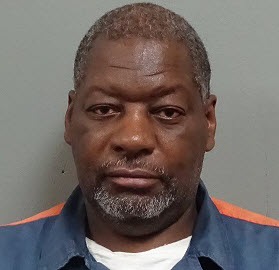
Charles Lewis, in prison since 1977 at age of 17, case dismissed by Judge Gershwin Drain on April 3, 2000 after state failed to comply with requirements to hold “Pearson” evidentiary hearing allowing “res gestae” witnesses who saw real shooter at scene to testify. Lewis’ attorney said he was guilty in opening argument.
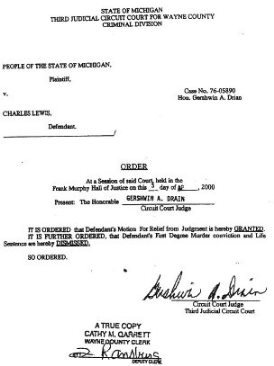
April 3, 2000 dismissal of Lewis’ case.
Judge Qiana Lillard acknowledges court order dismissing case at hearing April 21, 2016, takes no action
Lewis’ state court files, filling three cartons, have mysteriously “disappeared,” next hearing to feature last known official in possession
Lewis is one of state’s juvenile lifers whose case is being addressed under Montgomery v. Louisiana
By Diane Bukowski
April 29, 2016
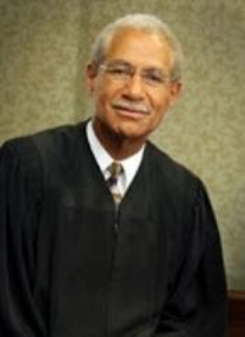
U.S. District Court Judge Gershwin A. Drain
DETROIT – Why is Charles Lewis, 58, locked up in Michigan prisons since the age of 17, still there? On April 3, 2000, previous Wayne County Circuit Court Judge Gershwin Drain ordered that a charge of first-degree murder and a sentence of life without parole against Lewis be summarily dismissed. That order has never been carried out.
Questions remain regarding his guilt in the case.
Wayne County Circuit Court Judge Qiana Lillard acknowledged having a copy of the order during a “show cause” hearing April 21, which Lewis “attended” through a videoconference from somewhere in the bowels of the Michigan Department of Corrections. She took no action on it.
“I’m excited that I got to make a record of the fact that I’m presently locked up without a conviction, or Court files or records,” Lewis said in a Jpay email to this author afterwards. “I got the chance to tell the judge that I was being held in prison without a conviction. She did not respond to that. She did say that she talked to Judge Drain, but did not elaborate on what they said to each other. I wanted to establish for the record the fact that I filed pleadings and she sent them back to me with no answer.
“Having me on a video is a violation of the Michigan Court Rules,” Lewis continued.
“That was designed for unruly people, and hearings that do not require testimony. When you take testimony you have a right to be present. So much for my rights.”

Charles Lewis’ mother Rosie Lewis in earlier years. From her daughter Wendy Lewis’ Facebook page. Mrs. Lewis and her daughter have vigorously fought for Charles’ freedom since 1977.
A prison counselor discovered Drain’s order in Lewis’ court records 10 years after it was issued and gave him a copy.
Lewis’ mother Rosie Lewis said she reviewed three cartons of files from her son’s case two years ago. Charles Lewis testified during the hearing that he last requested a copy of his complete file in June, 2013, to no avail. He said he also sent copies of the dismissal order to Wayne County Circuit Court Chief Judge Virgil Smith, to the clerk at the Michigan Supreme Court, and to the Corporation Counsel for the Third Judicial Circuit Court, Kimberley Reed-Thompson.
The three cartons of files mysteriously disappeared after that.
“My primary concern is that I am in prison without a conviction, and nobody has reviewed the matter,” Lewis testified. “Why did my file come up missing? Files just don’t come up missing.”
Lewis has said that Wayne County Judge James Chylinski, who inherited Drain’s caseload after he was appointed to the federal bench in the Eastern District of Michigan, earlier expressed his willingness to hold a hearing on Drain’s order. But Lewis’ case somehow wound up in front of Judge Lillard instead.
Two contradictory Registers of Actions kept by the Wayne County Clerk show filings only from 2000 onward. The current one says Lewis was convicted on April 3, 2000 by a jury, a blatant lie and possible criminal obstruction of justice, since his conviction occurred in 1977. A previous Register of Actions says Drain dismissed the case against Lewis on April 3, 2000.
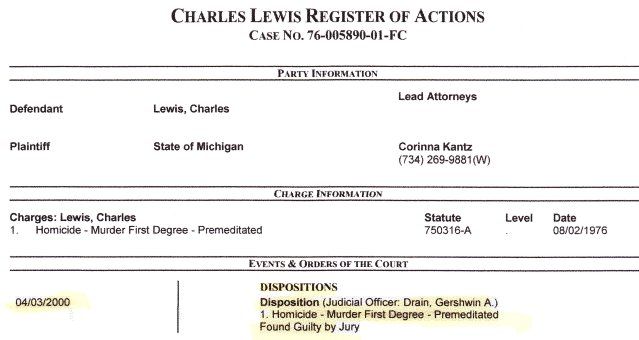
Current register showing Lewis’ conviction in 2000.

Disposition shown in earlier version of Register of Actions.
See full registers of actions at http://voiceofdetroit.net/wp-content/uploads/LewisRofA.pdf and http://voiceofdetroit.net/wp-content/uploads/LewisRofA2.pdf.
Wayne County prosecutors claimed Lewis murdered off-duty Detroit police officer Gerald A. Sypitkowski in 1976 outside a bar on Detroit’s east side. Newspaper articles at the time contradictorily said he and three friends either confronted Sypitkowski in the street, or tried to rob the bar itself. They also reported that Sypitkowski’s partner Dennis Van Fleteren, who was with him, witnessed the killing, which he said was carried out by the driver of a white Ford Mark IV named Leslie Nathaniel, not the young teens.

Dennis Van Fleteren/Facebook
Nathaniel was arrested and charged, but was later freed after allegedly passing a lie detector test. According to an inside source, Nathaniel was an autoworker known for loan sharking. According to the book, “Motor City Mafia–A Century of Organized Crime in Detroit,” by Scott M. Burnstein, the Mafia was heavily involved in loan sharking operations during that period.
Lewis was convicted in 1977, after two jury trials in front of Judge Joseph Maher. The first jury was excused after their deliberations without a reason. The second jury brought back a verdict of “guilty.”
In a federal motion for relief from judgment filed Feb. 11, 2016 , Lewis said M. Arthur Arduin, the court-appointed lawyer who represented him even after Lewis asked for his removal, acted against his interests. Lewis called him a “mob lawyer.”
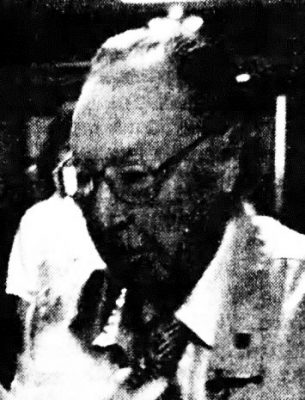
Attorney M. Arthur Arduin, Sr. at the age of 91, in Detroit Free Press series on seniors.
Lewis says not only Van Fleteren, but a bar employee and four college students driving in the area testified that they saw the shotgun blast which killed Sypitkowski come from a white Ford Mark IV. Two men even chased the car and identified its license plate, leading initially to the arrest of Leslie Nathaniel. Nathaniel testified at trial that two men tried to open the doors of his car and he fled from them.
During the second trial, Lewis says that the judge excluded police officers who questioned the eyewitnesses from testifying. He quotes from Arduin’s opening argument, evidently from transcripts Lewis retained:
“There’s been a killing . . .Now we have here only one defendant. But originally there were four young Blacks. If they were part of a gang, I don’t know. But let’s assume they were part of a gang. We’re going to prove by all the witnesses who are going to testify in this case–by all the witnesses I mean the People’s witnesses, their own witnesses, and I may have a witness or two for the defense. We’re going to prove four lads who are part of a gang, who are–expertise. Expertise–they knew how to steal cars and God only knows if they knew how to rob. Now that’s what we’re going to prove. And they started out on this day, July 1, 1976 — four of them, four of them–to steal a car and go out and commit a robbery.”
http://voiceofdetroit.net/wp-content/uploads/Charles-Lewis-motion-for-relief-from-judgment-1.pdf
According to a Free Press obituary, M. Arthur Arduin Sr., a resident of Grosse Pointe Farms and member of the Italian-American Lawyers Club, died at the age of 94 in 2002. His family’s original name was “Arduino.” See http://voiceofdetroit.net/wp-content/uploads/M-Arthur-Arduin-Sr-obituary.pdf
Lewis later filed for a “Pearson” evidentiary hearing, to produce factual (“res gestae”) witnesses who did not testify at his second trial.
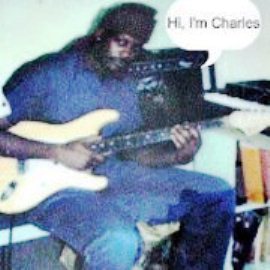
Photo from Lewis’ Facebook page, maintained by his sister Wendy.
The State failed to hold the hearing within the required time limit of 30 days, resulting in Judge Drain’s order of dismissal. When the state finally held a hearing a year later, Van Fleteren was not listed among the witnesses. However, he remains very much alive according to his Facebook page.
Leslie WIlliams, a woman police officer who arrived on the scene later did testify; she claimed Van Fleteren was too drunk to see what happened.
Before his imprisonment, Lewis was a musician, a guitarist, with his own band. He is a writer, who previously wrote for the Afro-American Gazette out of Grand Rapids as well as a prison newspaper, The Huron Valley Monitor. He said he took journalism and political science courses in college, when the MDOC still offered college courses.
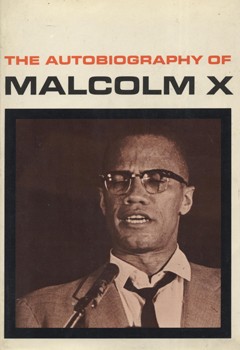
Autobiography of Malcolm X
Edward Sanders, another juvenile lifer who attained his bachelor’s degree in prison, wrote VOD that he knew Lewis when they were both incarcerated at Ionia prison in the late 1970’s.
“I used to read his books on the music business and the late El-Hajj Malik el-Shabaaz, [Malcolm X],” Sanders wrote. “We used to call him KK.” Newspaper articles at the time of Officer Sypitowski’s killing used Lewis’ nickname to claim he belonged to a youth gang known as the “KK Capones”. Lewis’ mother Rosie said the initials came from Kilbourne Street, where her son grew up.
Judge Lillard said the purpose of the April 21 court hearing was her previous order for Wayne County to produce Lewis’ full court file, issued March 17.
Lillard was appointed to the Wayne County Circuit Court bench by Governor Rick Snyder on Aug. 7, 2013, after spending eight years in the Wayne County Prosecutor’s Office. Her legal experience prior to that was with Detroit Edison, the Michigan Basic Property Insurance Association, and AAA Michigan, according to a campaign biography.

Judge Qiana Lillard
Prosecutors across Michigan are currently reviewing files of the state’s 364 “juvenile lifers” in an attempt to comply with Montgomery v. Louisiana. The U.S. Supreme Court decided Jan. 25, 2015, that its earlier ruling in Miller V. Alabama, calling juvenile life without parole “unconstitutional,” and “cruel and unusual punishment,” under the Sixth Amendment, is completely retroactive.
Michigan Attorney General Bill Schuette represented one of only four states in the U.S. which ultimately refused to acknowledge the retroactivity. The Michigan legislature earlier passed statutes allowing prosecutors to file LWOP re-sentencings for court hearings before judges or juries. Those prisoners they do not choose to request LWOP on will be automatically sentenced to a minimum of 25-40 and a maximum of 60 years.
It is questionable whether those statutes violate Miller, which requires an in-depth individual assessment of each prisoner at the time of the crime in question.
During the April 21 court hearing, one in a series, Lewis’ attorney Felicia O’Connor of Foley & Lardner, Wayne County Prosecutor Jason Williams, and Judge Lillard questioned David Baxter, clerk of the Wayne County Clerk’s criminal division, regarding the Lewis file. Baxter also sits on the Criminal Work Group Forms Committee of the state Supreme Court Administrator’s Office.

Lewis’ attorney Felicia O’Connor
“I have not been able to locate copies of that file,” Baxter said, “only a file from another 1976 case, and filings from the murder case since 2000.”
The other case, pertaining to an armed robbery, is closed according to the Michigan Department of Corrections OTIS website.
“We’ve been looking for the [murder] file for some time, at least two years,” Baker said. “The last judge who requested it was Edward Ewell, who took a civil assignment later. His clerk Joann Gaskin was the last person I know of who had the file in its entirety.”
In one prominent criminal case in 2011, Judge Ewell refused to grant a stay of Maryanne Godboldo’s criminal prosecution for standing off police officers who came to her home to take and medicate her 13-year-old daughter against her will, pending the outcome of a Michigan Supreme Court decision in Moreno. The Supreme Court later upheld the “common-law” right of individuals to resist illegal police conduct and arrests in Moreno.
Thirty-Sixth District Court Judge Ronald Giles and Circuit Court Judge Gregory Bill have since twice dismissed the charges against Godboldo, saying the “order” used to take Godboldo’s child was invalid, and she had a right to resist.
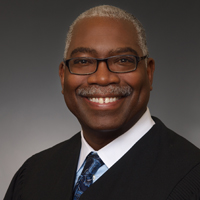
Wayne County Circuit Court Judge Edward Ewell.
Baxter said Gaskin would have sent Lewis’ file to the Clerk’s office on the ninth floor, and it would now be in storage at the Vigliotti Building on E. Jefferson. Baxter said he also contacted the Michigan Supreme Court, which has received the file numerous times pertaining to various appeals of Lewis’ case. He said he has not personally conducted a hands-on search for the file.
Judge Lillard said she would hold another hearing with Joann Gaskin as a witness on the next date the videoconference room is available. There is only one such room in the Frank Murphy Hall.
Lewis asked for her to direct both parties to submit briefs on the case, but Judge Lillard said they were only at an “investigatory” stage and refused to do so.
After the hearing, this reporter and Mrs. Lewis met with Attorney O’Connor, who said she has been directed by her firm, Foley & Lardner, not to waive attorney-client privilege in the case by discussing it with the media. Foley & Lardner is representing Lewis pro bono under an arrangement assigning lawyers to all state juvenile lifers, by noted defense attorney Deborah LaBelle.
This reporter and Mrs. Lewis then went to the 9th floor Clerk’s office to file our own request for the file, but have not heard back from them.
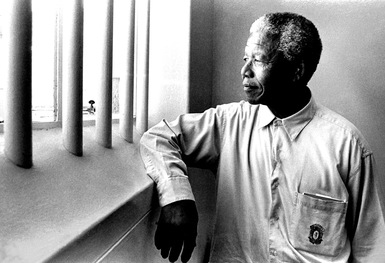
Nelson Mandela in prison in apartheid South Africa.
VOD has left a message for Judge Drain in his federal office in Detroit, and is awaiting his reply. This reporter has also contacted Dennis Van Fleteren through his Facebook page messages, and has received no reply from him yet. VOD intends to continue its investigation of this case, due to other anomalies discovered so far.
“I know that God has a plan for my life and that my struggle is not in vain,” Lewis wrote to this reporter. “It took Nelson Mandela 27 years to get out of prison. I’ve served nearly twice as much time as Nelson Mandela served under apartheid. It makes you wonder which system is the real apartheid system.”
Related story:
#FreeCharlesLewis, #FreeJuvenileLifers, #PrisonNation, #PoliceState, #Beatbackthebullies, #Saveourchildren, #StopWaronBlackAmerica, #BlackLivesMatter, #BlackLivesMatterDetroit, #StopSchooltoPrisonPipeline, #Standupnow, #MalcolmX, #NelsonMandela




